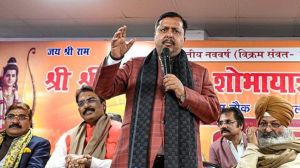Growth genie
Prime Minister Manmohan Singh has said that India needs to grow at 7-8 per cent annually to generate enough resources for welfare interventi...

Prime Minister Manmohan Singh has said that India needs to grow at 7-8 per cent annually to generate enough resources for welfare interventions like the employment guarantee programme. He is right for two reasons. One, high growth will give higher taxes and thus put resources in the hands of the government which can then be spent on its social welfare commitments. Two, higher growth in the economy will generate jobs and people will not have to fall back on a government run employment programme.
The job of the UPA government is to ensure that obstacles to growth and employment creation in the economy are removed. Among the first things it should examine are labour laws. Now that the Left has extracted its pound of flesh in terms of stalling disinvestment, the government has lost one possible mechanism for increasing efficiency and better allocation of resources. It must, therefore, explore other options. As India8217;s labour laws restrict the creation of new jobs by preventing employers from firing workers, the issue of how to expand jobs in the private sector must be put back on the agenda. Let the trade unions come up and say how employment will be generated other than by the state. Public sector or government jobs will always be constrained by the ability of the government to collect taxes. Unsustainable suggestions like borrowing or printing money to employ everyone in the economy are not worth the paper they are printed on and should not even be discussed. The solution, ultimately, has to lie in the growth of the private sector. The debate on how to do so must be initiated now. A handful of trade unions and workers already employed in the organised sector should not hold at ransom the future of the unemployed.
The additional point made by the prime minister is the need to rationalise subsidies and public expenditure. It is now well known that the amount of leakage from most anti-poverty programmes is huge. For example, it is estimated that 72 per cent of the money spent on PDS is wasted. It is essential that money be taken away from these badly targeted programmes to a better targeted one, while making sure that leakages are kept under control. For instance, every rupee spent on the employment guarantee programme should come from already existing schemes, from subsidies that do not reach the poor and subsidies such as those on LPG that benefit the rich.
- 01
- 02
- 03
- 04
- 05































